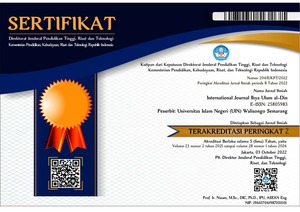Kaidah Fiqh dan Ushul Fiqh Tentang Produk Halal, Metode Istinbath dan Ijtihad dalam Menetapkan Hukum Produk Halal
DOI:
https://doi.org/10.21580/ihya.20.2.4048Keywords:
Al-Qur’an, Fatwa, Hadist, Istinbath, IjtihadAbstract
The purpose of the discovery of Islamic law must be understood by the mujtahid in order to develop legal thinking in Islam in general and answer contemporary legal issues whose cases are not explicitly regulated by the Koran and Hadith, especially those related to the field of muamalah. In reviewing the matter to be determined by law, the Indonesian Ulema Council Fatwa Commission is based on the Qur'an and Sunnah as its main source. In this context, there are several methods used by the Indonesian Ulema Council Fatwa Commission. First, every Fatwa Decree must have a basis on the Book of Allah and the Sunnah of the Apostle that is not bad, and not contrary to the benefit of the people. Second, if it is not found in the Book of Allah and the Sunnah of the Apostles, the Fatwa Decree should not contradict ijma ', qiyas that mu'tabar, and other legal arguments, such as ihtisan, maslahah mursalah, and saddu al-dzari'ah. Third, before making a decision before deciding on a fatwa, it must first be carefully studied for each problem presented to the MUI at least a week before the trial. If the problem is clear the law (qath'iy) let the commission convey it as it is, and the fatwa will fall after the text is known from the Koran and the Sunnah. Whereas in the case of khilafiyah occurring among the schools of thought, what is stated is the result of tarjih after observing the jurisprudence of muqaran (comparison) using the rules of ushul fiqh muqaran related to scholarship.
Downloads
References
Abd. Al-Wahhab Khallaf. 1972. Ilmu Ushul Fiqih. Jakarta: , Jakarta: Al-Majlis al-A’la al Indonesia li al-dakwah al Islamiyah.
Abdul Aziz Dahlan. 1997. Ensiklopedi Hukum Islam. Jakarta: PT. Ichtiar Baru Van Hoeve.
Aisjah Girindra. 1998. LP POM MUI Sejarah Sertifikasi Halal. Jakarta: LPPOM.
Alkaf Idrus. 1998. Ijtihad Menjawab Tantangan Jaman. Solo: Ramadhani.
BIMAS ISLAM. 2003. Himpunan Fatwa Majelis Ulama Indonesia. Jakarta: Direktorat Jenderal Bimbingan Masyarakat Islam dan Penyelenggara Haji Depag RI.
H.M. Atho Mudzhar. 1998. Membaca Gelombang Ijtihad; Antara Tradisi Dan Liberasi. Yogyakarta: Titian Ilahi Press.
Hamka. 1982. Studi Islam. Jakarta: Pustaka Panjimas.
Jaih Mubarok. 2002. Metodologi Ijtihad Hukum Islam. Yogyakarta: UII Press.
Koto Alaiddin. 2004. Ilmu Fiqih Dan Ushul Fiqih. Jakarta: Rajawali Pers.
Majelis Ulama Indonesia. 2015. Fatwa MUI. Jakarta: Erlangga.
MUI. 1997. Pedoman Penetapan Fatwa Majelis Ulama Indonesia. Indonesia.
Qardhawi Yusuf. 1995. Fatwa Fatwa Kontemporer. 2nd ed. Jakarta: Gema Insani Press.
Sarwat Ahmad. 2003. Halal Atau Haram. Jakarta: Gramedia.
Satria Effendi M Zein. 2009. Ushul Fiqh. Jakarta: Fajar Interpratama Offset.
Sayyid Sabiq. 1973. Fiqih Sunnah. Bandung: PT. Alama’arif.
Shidiq Sapiudin. 2014. Ushul Fiqh. 2nd ed. Jakarta: Kencana Prenada Media Group.
Syarifuddin Halim. 2005. Meretas Kebekuan Ijtihad. Jakarta: Ciputat Press.
Thabieb al-Asyhar. 2003. Bahaya Makanan Haram Bagi Kesehatan Jasmani Dan Kesucian Rohani. Jakarta: Al-Mawardi Prima.
Yusuf, Qardhawi. 2007. Halal Haram Dalam Islam. Jakarta: Era Intermedia.
Zahra, Muhammad Abu. 1995. Ushul Fiqih. Jakarta: PT. Pustaka Firdaus.
Downloads
Published
How to Cite
Issue
Section
License
By submitting an article to the journal, the author(s) agree to transfer the published article's copyright to the journal, which will act as the publisher. This means the journal will have the right to publish the article in various forms, including reprints. The journal will maintain the publishing rights to the published articles.
This work is licensed under Creative Commons Attribution-ShareAlike 4.0 International License.
In line with the license, authors and third parties (readers, researchers, and others) are allowed to share and adapt the material. In addition, the material must be given appropriate credit, provided with a link to the license, and indicated if changes were made. If authors remix, transform or build upon the material, authors must distribute their contributions under the same license as the original.



